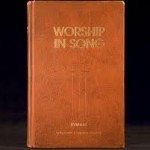Have you ever considered the impact you might have on the lives of others based on what you might, write, say or do? You might go throughout life unaware that there are people watching, listen and learning from you. Let’s look at one event that continues to impact millions of lives…
In the late 1880’s, a poet from Sweden by the name of Carl Boberg, was inspired by the beauty of God’s creation. His friend, J. Irving Erickson, capturing this awe inspiring moment wrote the following: “Carl Boberg and some friends were returning home to Mönsterås from Kronobäck (Sweden), where they had participated in an afternoon service. Nature was at its peak that radiant afternoon. Presently a thundercloud appeared on the horizon, and soon sharp lightning flashed across the sky. Strong winds swept over the meadows and billowing fields of grain. The thunder pealed in loud claps. Then rain came in cool fresh showers. In a little while the storm was over, and a rainbow appeared.
When Boberg arrived home, he opened the window and saw the bay of Mönsterås like a mirror before him…From the woods on the other side of the bay, he heard the song of a thrush…the church bells were tolling in the quiet evening. It was this series of sights, sounds, and experiences that inspired the writing of the song.”
Carl Boberg recounted the following information behind the inspiration for his poem:
“It was that time of year when everything seemed to be in its richest colouring; the birds were singing in trees and everywhere. It was very warm; a thunderstorm appeared on the horizon and soon thunder and lightning. We had to hurry to shelter. But the storm was soon over and the clear sky appeared.
“When I came home I opened my window toward the sea. There evidently had been a funeral and the bells were playing the tune of ‘When eternity’s clock calling my saved soul to its Sabbath rest.’ That evening, I wrote the song, ‘O Store Gud.'”
Years later a British missionary, Stuart K. Hine, was motivated by the poem (‘O Store Gud’, translated means ‘O Mighty God’) and wrote the words to a hymn that has touched million’s world wide. Baptized in 1914, Hine penned the words to the hymn, “How Great Thou Art” in 1949. Read this poem (sing this song) again…
“O Lord my God! When I in awesome wonder
Consider all the worlds (works) Thy hands have made,
I see the stars, I hear the rolling thunder,
Thy power throughout the universe displayed.
Then sings my soul, my Savior God to Thee;
How great Thou art, how great Thou art!”
The second verse references ‘the woods and forest’ and the ‘birds sing(ing) sweetly’. Like the first verse, the second gives us a reminder to the original poem. But here is a forgotten verse we need to reintroduce and bring back to life. This verse is a needed reminder from the unique, original work of Stuart Hine.
“When burdens press, and seem beyond endurance,
Bowed down with grief, to Him I lift my face;
And then in love He brings me sweet assurance:
‘My child! for thee sufficient is My grace’.”
If you enjoy learning about the history of our hymns (traditional and contemporary), I encourage you to look into the resources that can give you better understanding and clarity for the back ground of our songs of praise. The chorus of this hymn begins, “Then Sings My Soul…”, this is also the title of a great resource for hymn history. I encourage you to see for yourself the joy in Hymnology. You can find it on Amazon.com
Keep your mind on heaven, your eyes on God’s word and your focus on praising the King of Kings. When I stay close to Him, lift my voice and my heart to worship God…
“Then Sings My Soul!”











